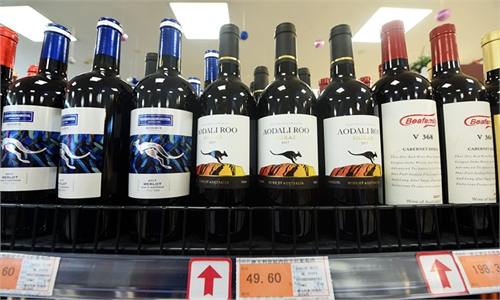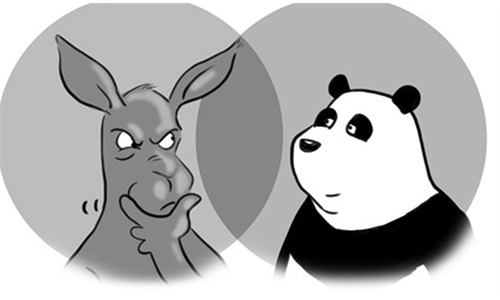
Illustration: Tang Tengfei/GT
An analysis published by ABC News on December 14 said Australia needs to find new trade partners as its relationship with China deteriorated beyond repair. The author, Ian Verrender, lays out how China has broken bilateral relations in the article. He argues that the Communist Party of China (CPC) has "infiltrated" Australia's "political, cultural and educational institutions" and that Beijing has already advanced the process decoupling with Australia. The author believes that the deterioration of China-Australia relations actually started much earlier - from the spat over Rio Tinto iron ore a decade ago. He holds it was good for Australia to not meet China's demand at that time because it helped the Aussies learn that iron ore was China's alleged "Achilles heel." He argues it will take years, perhaps decades, for Australian exporters to secure new markets. But it has been done before. Therefore, "it is time for a plan B." This is an eye-opening comment.
First of all, it is pure speculation about the CPC's infiltration into Australia. There is no evidence provided that there has been "infiltration." There has only been wild conspiracy mongering by Australian media who have maliciously fabricated news. For example, they framed a Chinese scholar who studies Australia as a Party member, but completely ignored the scholar's own clarification.
Verrender laid the blame squarely on China for the deterioration of China-Australian relations, calling it a deliberate attempt by China and portraying Australia as an innocent victim. But let's take a look who has been "innocent" these past two years. How has Australia provoked China?
On August 23, 2018, Australia banned Huawei from providing 5G technology to support the country's new telecommunications networks, becoming the first one in the world to do so.
In October, 2019, Australian Home Affairs Minister Peter Dutton accused China of infiltrating Australian universities. On April 19, 2020, Australian Foreign Minister Marise Payne called for an international inquiry into the origins of the COVID-19 pandemic, including China's handling the outbreak in Wuhan.
Other examples are countless: In June, Australian intelligence agents raided and questioned journalists from Xinhua News Agency, China News Service, and other Chinese media outlets. It then filed a declaration at the United Nations in July to interfere in China's sovereignty over the South China Sea. On July 29, it announced the suspension of the extradition treaty with the Hong Kong Special Administrative Region. Australia masqueraded as a victim and made direct or insinuating accusations against China. It has been politicizing economic, investment, technology and other issues.
While iron ore from Australia is important to China at present with 67 percent of standing inventory, there are other sources in Brazil and West Africa.
The truth is Australia is more in need of the Chinese market. Exports of more than $100 billion to China in the 2019-20 fiscal year account for 38.2 percent of its total foreign trade. Of that, iron ore alone accounts for $84.9 billion. With the current global recession, where is Australia going to find such a big buyer? The US, Europe, India or Russia? Who can replace China when it comes to education, lobster, red wine, coal and other export sectors? Verrender also knows that it will take years or even decades for Australian exporters to secure new markets. Can the Australian economy wait for years or decades?
In fact, since China and Australia established diplomatic relations in 1972, the two countries have developed good relations and bilateral exchanges have been frequent. If Australia can put aside its prejudices and sincerely repair relations with China, then there will be no problem for them to achieve a win-win situation.
Australian Prime Minister Scott Morrison's words on Tuesday hit the point: "Australia has always participated in China's economic development… We always have been a proponent of China's economic growth. We are not one of those countries that have sought to contain their growth."
It is hoped Australia can match its words with deeds.
The author is an associate professor and director of Australian Studies Center at Xi'an International Studies University. opinion@globaltimes.com.cn



